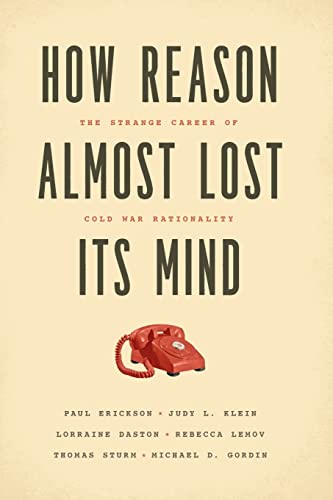Verwandte Artikel zu How Reason Almost Lost Its Mind: The Strange Career...

Inhaltsangabe
In the United States at the height of the Cold War, roughly between the end of World War II and the early 1980s, a new project of redefining rationality commanded the attention of sharp minds, powerful politicians, wealthy foundations, and top military brass. Its home was the human sciences—psychology, sociology, political science, and economics, among others—and its participants enlisted in an intellectual campaign to figure out what rationality should mean and how it could be deployed.
How Reason Almost Lost Its Mind brings to life the people—Herbert Simon, Oskar Morgenstern, Herman Kahn, Anatol Rapoport, Thomas Schelling, and many others—and places, including the RAND Corporation, the Center for Advanced Study in the Behavioral Sciences, the Cowles Commission for Research and Economics, and the Council on Foreign Relations, that played a key role in putting forth a “Cold War rationality.” Decision makers harnessed this picture of rationality—optimizing, formal, algorithmic, and mechanical—in their quest to understand phenomena as diverse as economic transactions, biological evolution, political elections, international relations, and military strategy. The authors chronicle and illuminate what it meant to be rational in the age of nuclear brinkmanship.
Die Inhaltsangabe kann sich auf eine andere Ausgabe dieses Titels beziehen.
Über die Autorin bzw. den Autor
Paul Erickson is assistant professor of history and science in society at Wesleyan University and lives in Middletown, CT. Judy L. Klein is professor of economics at Mary Baldwin College and lives in Staunton, VA. Lorraine Daston is director of the Max Planck Institute for the History of Science and visiting professor in the Committee on Social Thought at the University of Chicago. She lives in Berlin, Germany. Rebecca Lemov is associate professor of the history of science at Harvard University and lives in Cambridge, MA. Thomas Sturm is a Ramon y Cajal Research Professor in the Department of Philosophy at the Autonomous University of Barcelona and lives in Cerdanyola del Valles, Spain. Michael D. Gordin is professor of the history of science at Princeton University and lives in Princeton, NJ.
„Über diesen Titel“ kann sich auf eine andere Ausgabe dieses Titels beziehen.
Neu kaufen
Diesen Artikel anzeigenGratis für den Versand innerhalb von/der USA
Versandziele, Kosten & DauerSuchergebnisse für How Reason Almost Lost Its Mind: The Strange Career...
How Reason Almost Lost Its Mind - The Strange Career of Cold War Rationality
Anbieter: PBShop.store US, Wood Dale, IL, USA
PAP. Zustand: New. New Book. Shipped from UK. Established seller since 2000. Artikel-Nr. GB-9780226324159
Anzahl: 2 verfügbar
How Reason Almost Lost Its Mind - The Strange Career of Cold War Rationality
Anbieter: PBShop.store UK, Fairford, GLOS, Vereinigtes Königreich
PAP. Zustand: New. New Book. Shipped from UK. Established seller since 2000. Artikel-Nr. GB-9780226324159
Anzahl: 2 verfügbar
How Reason Almost Lost Its Mind: The Strange Career of Cold War Rationality
Anbieter: Majestic Books, Hounslow, Vereinigtes Königreich
Zustand: New. pp. 272. Artikel-Nr. 373591793
Anzahl: 3 verfügbar
How Reason Almost Lost its Mind
Anbieter: Kennys Bookstore, Olney, MD, USA
Zustand: New. Num Pages: 272 pages, black & white illustrations. BIC Classification: 1KBB; 3JJP; HBJK; HBLW3; HBTW; HPS; JFCX. Category: (G) General (US: Trade). Dimension: 229 x 152 x 15. Weight in Grams: 398. . 2015. Paperback. . . . . Books ship from the US and Ireland. Artikel-Nr. V9780226324159
Anzahl: Mehr als 20 verfügbar
How Reason Almost Lost Its Mind: The Strange Career of Cold War Rationality
Anbieter: Ria Christie Collections, Uxbridge, Vereinigtes Königreich
Zustand: New. In. Artikel-Nr. ria9780226324159_new
Anzahl: Mehr als 20 verfügbar
How Reason Almost Lost Its Mind The Strange Career of Cold War Rationality
Anbieter: Revaluation Books, Exeter, Vereinigtes Königreich
Paperback. Zustand: Brand New. reprint edition. 259 pages. 9.25x6.00x0.75 inches. In Stock. Artikel-Nr. x-022632415X
Anzahl: 2 verfügbar
HOW REASON ALMOST LOST ITS MIND
Anbieter: Speedyhen, London, Vereinigtes Königreich
Zustand: NEW. Artikel-Nr. NW9780226324159
Anzahl: 2 verfügbar
How Reason Almost Lost its Mind
Anbieter: moluna, Greven, Deutschland
Zustand: New. KlappentextIn the United States at the height of the Cold War, roughly between the end of World War II and the early 1980s, a new project of redefining rationality commanded the attention of sharp minds, powerful politicians, wealthy fou. Artikel-Nr. 39325772
Anzahl: 2 verfügbar
How Reason Almost Lost Its Mind : The Strange Career of Cold War Rationality
Anbieter: AHA-BUCH GmbH, Einbeck, Deutschland
Taschenbuch. Zustand: Neu. Neuware - In the United States at the height of the Cold War, roughly between the end of World War II and the early 1980s, a new project of redefining rationality commanded the attention of sharp minds, powerful politicians, wealthy foundations, and top military brass. Its home was the human sciences-psychology, sociology, political science, and economics, among others-and its participants enlisted in an intellectual campaign to figure out what rationality should mean and how it could be deployed. How Reason Almost Lost Its Mind brings to life the people-Herbert Simon, Oskar Morgenstern, Herman Kahn, Anatol Rapoport, Thomas Schelling, and many others-and places, including the RAND Corporation, the Center for Advanced Study in the Behavioral Sciences, the Cowles Commission for Research and Economics, and the Council on Foreign Relations, that played a key role in putting forth a 'Cold War rationality.' Decision makers harnessed this picture of rationality-optimizing, formal, algorithmic, and mechanical-in their quest to understand phenomena as diverse as economic transactions, biological evolution, political elections, international relations, and military strategy. The authors chronicle and illuminate what it meant to be rational in the age of nuclear brinkmanship. Artikel-Nr. 9780226324159
Anzahl: 2 verfügbar

